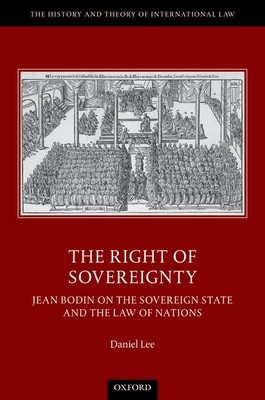
- We will send in 10–14 business days.
- Author: Daniel Lee
- Publisher: Oxford University Press, USA
- ISBN-10: 0198755538
- ISBN-13: 9780198755531
- Format: 16.4 x 23.7 x 2.3 cm, kieti viršeliai
- Language: English
- SAVE -10% with code: EXTRA
Reviews
Description
Sovereignty is the vital organizing principle of modern international law. This book examines the origins of that principle in the legal and political thought of its most influential theorist, Jean Bodin (1529/30-1596). As the author argues in this study, Bodin's most lasting theoretical
contribution was his thesis that sovereignty must be conceptualized as an indivisible bundle of legal rights constitutive of statehood. While these uniform 'rights of sovereignty' licensed all states to exercise numerous exclusive powers, including the absolute power to 'absolve' and release its
citizens from legal duties, they were ultimately derived from, and therefore limited by, the law of nations. The book explores Bodin's creative synthesis of classical sources in philosophy, history, and the medieval legal science of Roman and canon law in crafting the rules governing state-centric
politics.
interest specialists in political theory and the history of modern political thought, as well as legal history, the philosophy of law, and international law.
EXTRA 10 % discount with code: EXTRA
The promotion ends in 21d.22:01:28
The discount code is valid when purchasing from 10 €. Discounts do not stack.
- Author: Daniel Lee
- Publisher: Oxford University Press, USA
- ISBN-10: 0198755538
- ISBN-13: 9780198755531
- Format: 16.4 x 23.7 x 2.3 cm, kieti viršeliai
- Language: English English
Sovereignty is the vital organizing principle of modern international law. This book examines the origins of that principle in the legal and political thought of its most influential theorist, Jean Bodin (1529/30-1596). As the author argues in this study, Bodin's most lasting theoretical
contribution was his thesis that sovereignty must be conceptualized as an indivisible bundle of legal rights constitutive of statehood. While these uniform 'rights of sovereignty' licensed all states to exercise numerous exclusive powers, including the absolute power to 'absolve' and release its
citizens from legal duties, they were ultimately derived from, and therefore limited by, the law of nations. The book explores Bodin's creative synthesis of classical sources in philosophy, history, and the medieval legal science of Roman and canon law in crafting the rules governing state-centric
politics.
interest specialists in political theory and the history of modern political thought, as well as legal history, the philosophy of law, and international law.


Reviews